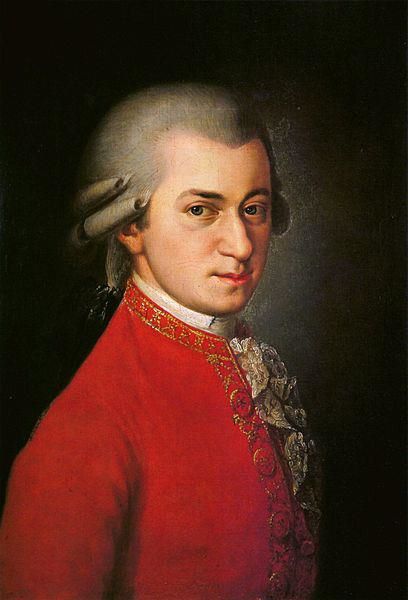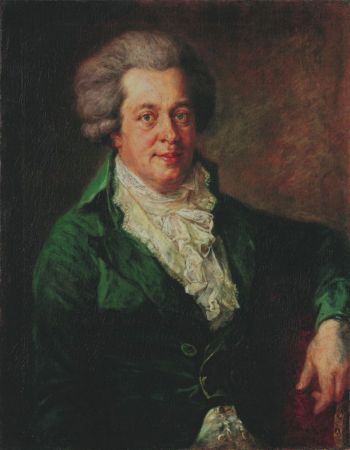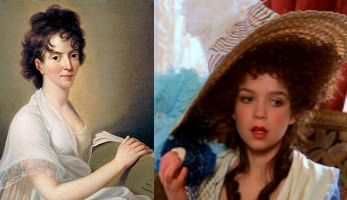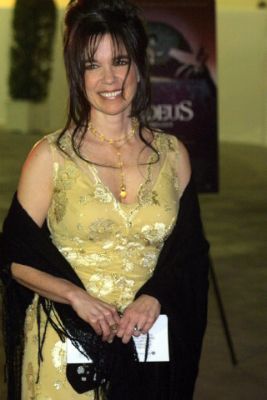
Actor Tom Hulce, aging adolescent hippy at age 53.
Mozart looked nothing like this in later years.
There is silly film on Mozart, called Amadeus, where he is made out to be a bumbling idiot. The portraits of Mozart show him to be a serious, observant man. He has to be, to write the kind of music he wrote.

Posthumous Mozart portrait painted by Barbara Kraft in 1819,
under the supervision of Nannerl Mozart
(Here is more information on the authenticity of the portrait - pdf)
One theory about the above portrait is that its model is a Mozart family portrait by Johann Nepomuk della Croce painted in 1780. Mozart would have been about twenty-four then. Men were mature and serious in their early twenties. Now, we have immaturity all the way to the grave.

Mozart
Date Painted: 1790 (a year before Mozart's death, at age 34)
By: Johann Georg Edlinger, 1741-1819
Oil Painting
31.5 x 24.5 inches
This is a more relaxed pose than the one above, with Mozart's hand casually on the back of a chair. Probably by then, Mozart was more confident about his talent, and his role and position in German society.
The actor who plays Mozart in Amadeus looks nothing like him. Why wouldn't a director try to find an actor with as close a resemblance to the character as possible? And if that wasn't possible, why not use film props (make-up, costume, hair, weight gain/ weight loss, etc.), to make him look like his character?
One reason, I think, is that a Hollywood film on a classical musician is difficult to sell to the general public. It might work for a serious production like the BBC, or as a documentary, but for the popcorn popping audience, we need something more FUN. And the idiot the filmmakers chose to play Mozart certainly has that fun credential.
His call to fame, besides his Mozart role, is acting in National Lampoon Animal House as a freshman in college trying to get into a fraternity. The only one that would consider him are The Deltas, who:
...are a motley fraternity of rejects and maladjusted undergraduates whose main goal is disrupting the staid, peaceful, rigidly orthodox, and totally hypocritical social order of the school. The Deltas, oblivious to the danger they're in, are having a great time, steeped in irreverence, mild debauchery, and occasional drunkenness, led by the seniors and pledge master John "Bluto" Blutarsky (John Belushi). They're given enough rope to hang themselves, but even then manage to get into comical misadventures, culminating in the commission of one last, utterly senseless (and funny) act of rebellion.Roger Ebert, the film critic, says of the film:
The movie is vulgar, raunchy, ribald, and occasionally scatological. It finds some kind of precarious balance between insanity and accuracy, between cheerfully wretched excess and an ability to reproduce the most revealing nuances of human behavior.Roger Ebert, for some reason, writes affectionately about these brothers, calling their debauchery mild and their drunkenness occasional. The film is one long drunken debauchery, not by maladjusted undergraduates, but mentally deficient young men who had no reason being in college. (I myself saw it in college, as a hard-working college student. My degree was in biology. There was no time to fool around.)
Wikipedia says that Hulce is "openly gay." Trust Hollywood to cast a homosexual in the role of Mozart, who then portrays him like some kind of fairy. Even Mozart's relationship with his wife Constanze, whom he called "Dearest, most beloved little wife," is depicted as some kind of adolescent frolic.

Constanze Mozart
Date Painted: c.1789
By: Joseph Lange, 1751–1831
Oil on canvas
12.7 x 9.8 inches

Left: Portrait of the widowed Constanze Mozart
Date Painted: 1802 (she would be forty years old)
By: Hans Hansen, 1769-1828
Oil on Canvas
[I cannot yet find the dimensions of the original]
Right: The girlish actress who portrays Constanze in Amadeus in 1984
Can the Hollywood actress who played Constanze ever look like the mature widow?
Here is the answer:

Elizabeth Berridge, who played Constanze in 1984,
fifty and still girlish in 2012.
Mozart's music is everywhere. I am sure most people would recognize some melody or piece, which they may have heard in some elevator muzak, in a commercial, or in a restaurant. Many films also use classical music, and I'm sure Mozart's fills in many a background soundtrack. Thus, directors could try a little harder to bring Mozart to the public. Not by making him into a bumbling idiot, but by bringing out the inherent joy of life that Mozart had (as I write here about Mozart's twists and turns, almost joking with us, in his music).
But Amadeus isn't even using comedic artistic licence. It is something much more nefarious than that.
Amadeus demonstrates the general desecration of beauty by a small elite of sophisticated people. They know what they're doing. Demeaning Mozart and destroying his music is like destroying beauty. Destroying beauty is destroying God, the good, and our land and civilization. What they want is to form something else out of the rubble of their destruction, something which they can recreate to their own desires and specifications. Their ambition is nothing short of god-like. They are the Nazis of our era, but even more sophisticated, more patient, and less overtly violent.
------------------------------------------------------------------------------------------------------------------------------------------------------------
Posted By: Kidist P. Asrat
